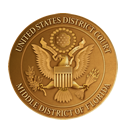
From 1940 until 1973, during both peacetime and periods of conflict, men were drafted to fill vacancies in the armed forces that could not be filled through voluntary means.
In the 1960s and early 1970s, the government filed many cases against men who failed to report for military duty in Florida and elsewhere. The United States was involved in an increasingly unpopular war in Vietnam. Large numbers of people resisted military service, claiming to be conscientious objectors, people whose personal beliefs are incompatible with military service. These young men were prosecuted criminally for refusal to comply with draft board orders calling them into military service for the Vietnam War.
These were agonizing times. A conscientious objector faced with criminal prosecution had to choose between violating his conscience, going to prison, or fleeing the country.
 Sam Jacobson
Sam JacobsonSam Jacobson defended many Vietnam War era conscientious objectors.
“The defendants were young men who had developed genuinely held conscientious objections to war because of moral qualms about the Vietnam War. Or they were members of established religious sects, like Jehovah’s Witnesses, whose religious beliefs prohibited compliance with Selective Service System orders. They were, by and large, regular mainstream Americans and certainly not criminals. It was heartbreaking to see really decent young men marched off to prison for their beliefs.”
